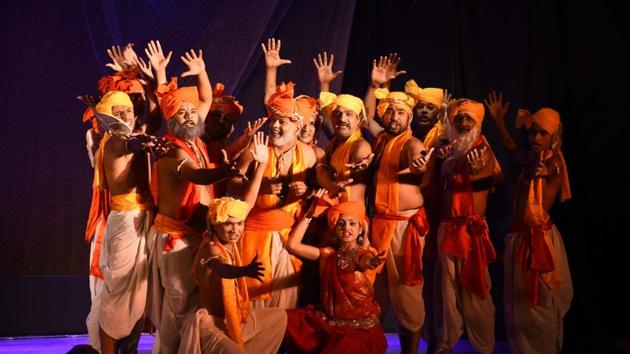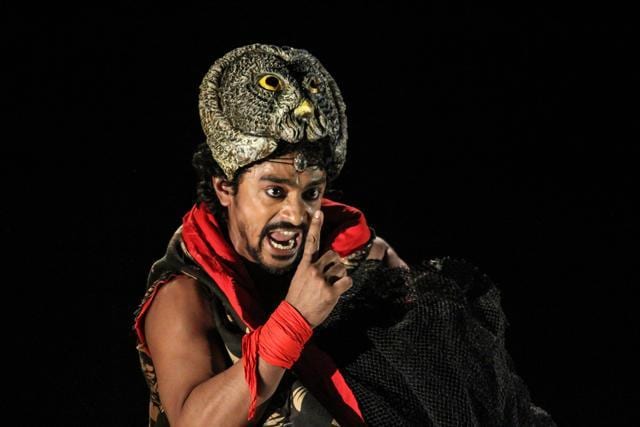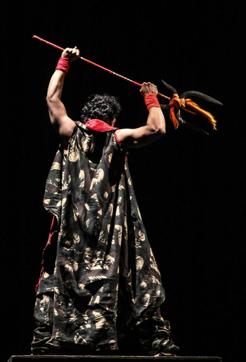Rang Mahotsav: retelling epics for the modern age
From solo acts to dance dramas to folk theatre, there’s something for everyone at this 21-day-long theatre festival.
The biggest theatre festival in the country is back. And it’s roster reflects an overwhelming interest in Indian epics. The National School of Drama’s Bharat Rang Mahotsav packs in a variety of themes and theatre forms: non-verbal plays, solos, dance dramas, classics, originals, traditional folk theatre. But many of the plays, across languages, explore the anxieties of today’s polarised world, using the Ramayana and the Mahabharata to comment on modern tales of patriarchy and resistance.

The annual theatre jamboree, now in its 19th year, kicked off on February 1 with veteran director, the late Kavalam Narayana Panikkar’s classic play, Uttara Rama Charitham, which charts the dilemna of a Ram torn between his duties and desires. This year’s theme: ‘Whose theatre is it anyway?’

The war machine
In the opening week, Katkatha Puppet Arts Trust’s Mahabharata (Hindi/English/Kannada), explored the motives of 13 characters from the epic, emphasising those traits of theirs that led to the war. “The back stories that people often do not know, as well as certain nuances of the characters is what we explore through 13 characters,” says director Anurupa Roy. “Like Yudhishthira couldn’t help himself when he gambled,” she adds. “He didn’t know when to say no or stop. Or Shakuni’s backstory. He wasn’t just an evil man.His family had been killed off by Bhishma.”
There’s a lot about war in the Mahabharata, says Roy, and that’s what makes the story relevant through time. “War is still relevant today,” she adds. “The world is constantly contemplating war and that’s our recent reality.”
The 21-day-long festival will feature 94 performances by theatre troupes from 16 states and 12 countries, including Russia, Italy, Israel, Afghanistan, Romania, Sri Lanka and Bangladesh. Around 30 plays will also travel to five cities — Kurukshetra, Agartala, Patna, Pune and Hyderabad — during the month.
Increasing violence across the world is also what led Suman Saha of Bengal Repertory to write and direct Ashwatthama: The War Machine (Bengali). “The past decades have been cycles of repetitive violence be it in the name of religion or politics,” he says. “I was looking for a play that would reflect the present reality.”
He found inspiration in Ashwathama ‘s story in the sixth parva of the Mahabharata: the ghastly tale of how Ashwathama murders the sons of the Pandavas while they are asleep.
Saha’s anti-war play also explores the modern psychology of violence. Here, Ashwathama is a pawn in a larger game, much like soldiers in modern wars. “The blindness of Ashwathama is another theme,” says Saha. “In my play, he is not an individual but an instinct — that drives us to kill.”
READ MORE: A puppet artist explores Indian mythology
Re-imagined resistance
An array of plays on the Mahabharata is rarely complete without a production on Karna, whose inner turmoil and resilience on the 16th day of the Kurukshetra war is the subject of the group Aesthetic4world’s play, Karn (Maharathi). It’s performed in the Dashavtar theatre form, which involves an oral script and spontaneous dialogues.
A Varanasi-based theatre group’s dance drama, Ram Ki Shakti Puja, based on Hindi poet Suryakant Tripathi Nirala’s poem, looks at an episode during the war in Ramayana to portray new ideas of resistance. “When Ram finds out that Goddess Durga is fighting on Ravana’s side, he becomes dejected,” says director Vyomesh Shukla. “Jambavan, the bear, then advises him ‘Shakti ki karo maulic kalpana’.”
For Shukla, it is this re-imagining of power that makes Ram a contemporary man — like Mahatma Gandhi or Karl Marx — who takes on a system through his “maulic kalpana” (original idea). In a break from the traditional Ram lilas of Varanasi (where high-caste men play major parts including that of Sita), Shukla has cast women in the roles of Ram and Lakshman.

READ MORE: A new book reinvents Draupadi as a party animal
Eternal tales
In Panchali Ki Shapath (Hindi), a musical drama by Rangprayog from Madhya Pradesh, Draupadi’s public humiliation becomes the lens for addressing violence against women. The play is adapted from poet-and-freedom fighter Subramania Bharati’s poem, Panchali Sapatham. “We’ve added references of contemporary events to the narrative, be it what happened to Nirbhaya in Delhi or Thangjam Manorama in Manipur,” says director Rajkumar Raikwar. “The stories of Mahabharata will be relevant till the end of time,” he says. “Duryodhana exists even today, only his face has changed.”
Chitra, a Manipuri warrior princess and a minor character in the Mahabharata, is the subject of two productions at the festival. The first, by the Udupi-based theatre group Nrityaniketana Kodavoor, is a Kannada adaptation of Rabindranath Tagore’s one-act play Chitra. The second is by Odissi exponent Ranjana Gauhar, whose dance production Chitrangada combines Tagore’s play with his dance drama on the same subject.
For Gauhar, Chitra is a woman of substance who asks Arjun to treat her as an equal when he asks for her hand in marriage. “Her inner churning and constant questioning of herself makes her relevant to our times,” says Gauhar. In his director’s note about the play, Dr Shripad Bhat describes it as “relevant in a time of ‘ultra-nationalistic identity’ and popular acceptance of the aggressive masculine ideals of power. The subversion of the existing discourse is possible only if we can establish a dialogue with it.”
What: Bharat Rang Mahotsav: International Theatre Festival of India
When: Until February 21, 2 pm onwards
Where: Multiple venues. Please check schedule for each play.
Book tickets here.





